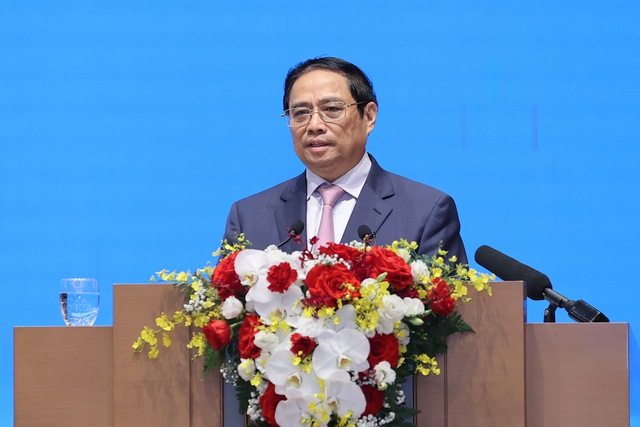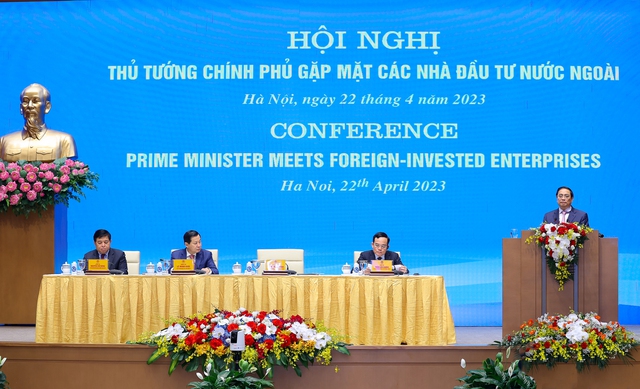Prime Minister asks for measures to reduce business costs
VGP - Prime Minister Pham Minh Chinh underlined the necessity of take fresh breakthrough measures to reduce business costs while chairing a conference with foreign-invested businesses on Saturday.

Prime Minister Pham Minh Chinh chairs a conference with foreign-invested businesses, Ha Noi, April 22, 2023 - Photo: VGP
This is the largest-ever teleconference with foreign-invested ones, connecting with 100 points nationwide and 83 points overseas.
Regarding the global minimum corporate income tax initiated by the Organization for Economic Cooperation and Development (OECD), Pham noted that Viet Nam always upholds the rule of law and actively takes part in international commitments, including the commitment on the global minimum corporate income tax.
Besides tax preferences, the Government has ordered reviewing and taking measures to attract investment that are not contrary to the international commitments to ensure the harmonization of interests of all relevant sides and assure just and equitable treatment for enterprises, stated the Prime Minister.
Specifically, the Government will support businesses in terms of land, scientific and technological research expenses, administrative reform, social housing, housing for workers, human resource training, and infrastructure development to encourage more foreign investment into the country, he shared.
The Prime Minister called on foreign investors to build long-term, sustainable and environment-friendly business strategies in Viet Nam, with a focus on such new areas as digital transformation, green transition, circular economy, innovation and climate change adaption.
Viet Nam always welcomes and creates favorable conditions for investors to launch successful operation in the country, Pham reiterated.
According to the global minimum tax, a tax rate of 15 percent will be applicable to firms with an annual turnover of €750 million.
This tax policy is scheduled to take effect in most EU states, along with Japan, the Republic of Korea, Singapore, Indonesia, Hong Kong (China), and Australia, among others in 2024.
Currently, Viet Nam boasts about 335 projects with registered investment capital of over US$100 million each operating in the fields of processing and manufacturing in economic and industrial zones.
Most of them are invested by high-tech firms, such as Samsung, Intel, LG, Bosch, Sharp, Panasonic, Foxconn, and Pegatron, with all of these likely to be subject to the global minimum tax if it is applied in Viet Nam.
With an average income tax rate of around 12.3 percent, even as low as 2.75 to 5.95 percent, the country is using tax incentives as a solution to attract foreign investment.

Viet Nam - top destination for foreign investors
Foreign investment inflows to Viet Nam totalled US$27.72 billion in 2022, reported the Ministry of Planning and Investment.
The above figure includes US$12.45 billion poured in 2,036 newly-licensed FDI projects while foreign investors raised investment capital by US$10.12 billion in 1,107 projects, up over 12 percent on year in terms of investment volume and number of projects.
Meanwhile, FDI disbursement in 2022 reached a new record of nearly US$22.4 billion, up 13.5 percent against the previous year, according to the General Statistics Office (GSO).
By the end of last year, the country was home to 36,278 valid projects with a total registered capital of approximately US$438.7 billion. The accumulated realized capital of foreign investment projects topped US$274 billion, equaling 62.5 percent of the total valid registered investment capital.
The ministry forecasted that the nation is likely to attract US$36-38 billion in FDI in 2023.
Meanwhile, according to the latest report of the world's leading brand valuation consulting company-Brand Finance, Viet Nam's national brand value increased by 11 percent in 2022, from US$388 billion to US$431 billion.
The Southeast Asian country had seen the third highest increase in brand value during the pandemic in absolute terms. The figure grew from US$184 billion to US$431 billion in 2022 but had the fastest growth in the world in relative value, up 74 percent from 2019.
